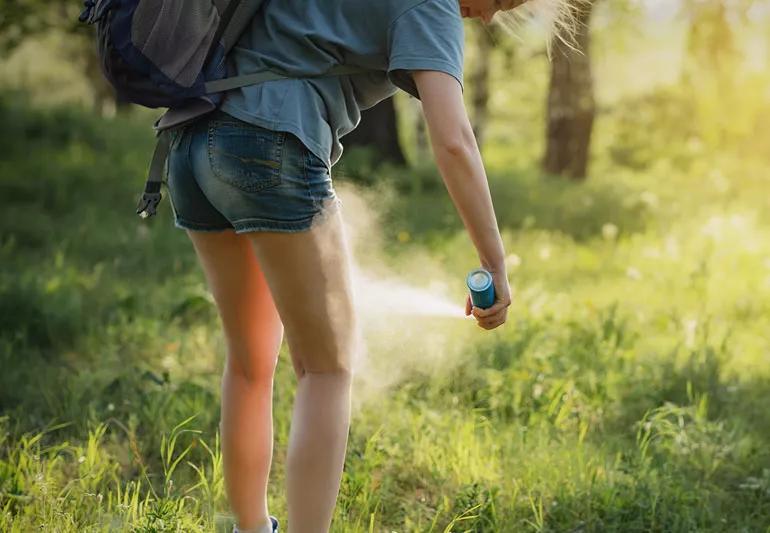
Image content: This image is available to view online.
View image online (https://assets.clevelandclinic.org/transform/f1fb982c-637f-4a39-9e4f-ef02b07a7781/bugSpray-1160749026-770x553-1_jpg)
woman applying bug spray while on a hike
Like a moth to a flame, biting insects are there to ruin every warm-weather affair. So how do you make them scram so you can enjoy the great outdoors? Family medicine specialist Donald Ford, MD, shares the science behind bug sprays and gives tips to help you avoid becoming their catch of the day.
Advertisement
Cleveland Clinic is a non-profit academic medical center. Advertising on our site helps support our mission. We do not endorse non-Cleveland Clinic products or services. Policy
When you put bug repellent on your skin, it immediately starts evaporating, forming an invisible cloud of chemicals around you. (Think: Pig-Pen from Charlie Brown.)
“Insects perceive these chemicals in the air and stay away,” says Dr. Ford.
When it comes to bug bites, an ounce of prevention is worth a pound of cure. Insect bites range from annoying to deadly — they can also be irritating, painful and ultimately lead to disease.
“There are significant mosquito-borne diseases. We don’t see too many in the northern part of the United States. They exist more in the southern United States, southern parts of the world, the Caribbean and South America,” says Dr. Ford. “Malaria is the most well-known and causes the most damage. Yellow fever has also been a significant problem worldwide.”
Other illnesses caused by biting insects include:
Advertisement
On the shortlist of effective bug repellents, two active ingredients reign supreme:
And if you’re looking for a one-two punch, Dr. Ford says the insecticide permethrin is fairly effective. However, you need to use it very carefully.
“You can either buy permethrin-treated clothing or apply it to clothing yourself. That plus DEET is the most effective strategy for repelling insects. You should not apply permethrin directly to the skin, but once it’s dried on clothing, it’s OK to wear.”
While bug sprays sometimes get a bad rap, Dr. Ford says they are safe. “The amount of chemicals absorbed into the skin is very low. Even in those low amounts, there are no recognized toxic effects.”
In fact, the U.S. Environmental Protection Agency (EPA) has said DEET is safe for use in both children and adults. “The harm comes when people ingest these chemicals,” notes Dr. Ford. “So use caution when applying repellents on children since kids are more likely to touch their skin, put their hands in their mouth or touch their eyes. We also recommend washing your hands after you apply. And use products labeled safe for children because they have slightly lower chemical concentrations.”
Are natural mosquito repellents and bug sprays effective?
Not sold on chemical bug sprays? Dr. Ford says the oil of lemon eucalyptus is the way to go if you prefer all-natural repellents.It comes from the leaves of the lemon eucalyptus tree, which grows in Australia. “Its active ingredient is PMD (para-menthane-3,8-diol), but it’s thought to be less effective than DEET and picaridin,” he says. “Beyond that, no other oils or natural products have been proven effective. That includes citronella, which sometimes is sold for use on the skin or as a candle.”
Advertisement

Sign up for our Health Essentials emails for expert guidance on nutrition, fitness, sleep, skin care and more.
Learn more about our editorial process.
Advertisement
Most recommended precautions center around minimizing bruising or swelling
Even one drink can have an impact on your cognitive function leading to slurred speech, blurred vision and impaired memory
Understand who may (and may not) benefit
Lorem ipsum dolor sit amet. Et odio Quis vel ipsam omnis eum alias deleniti et placeat impedit non voluptas galisum hic autem enim et cupiditate aliquid. Est beatae quidem non facilis autem ut commodi nisi aut tempore rerum et dolores voluptatem cum enim optio id sapiente quasi. Ad laboriosam officiis 33 cupiditate sequi ea voluptatum consectetur qui necessitatibus voluptate et quasi doloremque et facere explicabo quo explicabo officia
Seeking help through therapy can be an important step in improving your quality of life when you have UC
Type 2 diabetes isn’t inevitable with these dietary changes
Applying a hot or cold compress can help with pain
Pump up your iron intake with foods like tuna, tofu and turkey